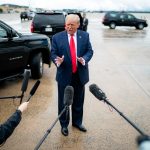Peter Navarro, former trade adviser to President Donald Trump, argues that free trade principles have unexpected ideological roots, stating, “Free trade is based on Marxism, in a way.” This provocative claim centers on his critique of the Ricardian model of comparative advantage, which underpins modern free-trade theory. Navarro asserts that David Ricardo’s 19th-century framework assumes winners of trade (e.g., corporations) must compensate losers (e.g., displaced workers)—a concept he likens to wealth redistribution akin to Marxist principles.
– The Ricardian model posits that countries should specialize in goods they produce efficiently and trade for others. However, Navarro stresses that its “buried” requirement for compensating displaced workers mirrors socialist ideas of redistributing gains from capital to labor.
– He dismisses this assumption as unrealistic in today’s globalized economy, where corporations and governments rarely offset losses from offshoring or automation, leaving workers stranded.
Navarro argues that free trade has failed due to widespread cheating by nations like China, the EU, and Vietnam, which exploit “unfair practices” such as subsidies, currency manipulation, and intellectual property theft. He claims these actions have hollowed out U.S. manufacturing, citing the loss of 70,000 factories and 25 million jobs since China’s 2001 WTO entry. His solution—reciprocal tariffs—aims to force trading partners to match U.S. trade terms, a policy he frames as “fair” rather than protectionist.
While Navarro’s analogy to Marxism is contentious, it reflects his view that free-trade theory relies on idealized redistribution mechanisms absent in practice. Marx himself saw free trade as accelerating capitalism’s contradictions, writing that it would deepen class divides and hasten revolutionary conditions. Navarro repurposes this critique to highlight how uncompensated trade losses destabilize societies, though he opposes Marxist solutions, advocating instead for nationalist policies to reclaim economic sovereignty.
Mainstream economists widely reject Navarro’s views as fringe, arguing his tariff policies risk trade wars and higher consumer costs. Critics also note his dismissal of Ricardo’s theories ignores their adaptability to modern contexts. Nonetheless, Navarro’s alignment with Trump’s “America First” agenda has reshaped U.S. trade policy, emphasizing confrontation over cooperation with adversarial trading partners.




